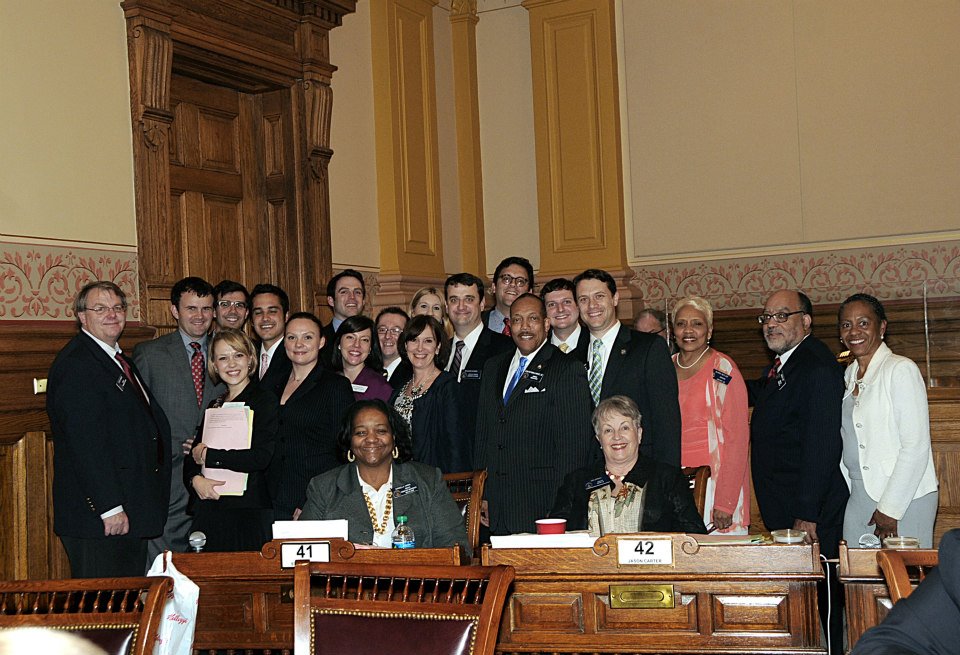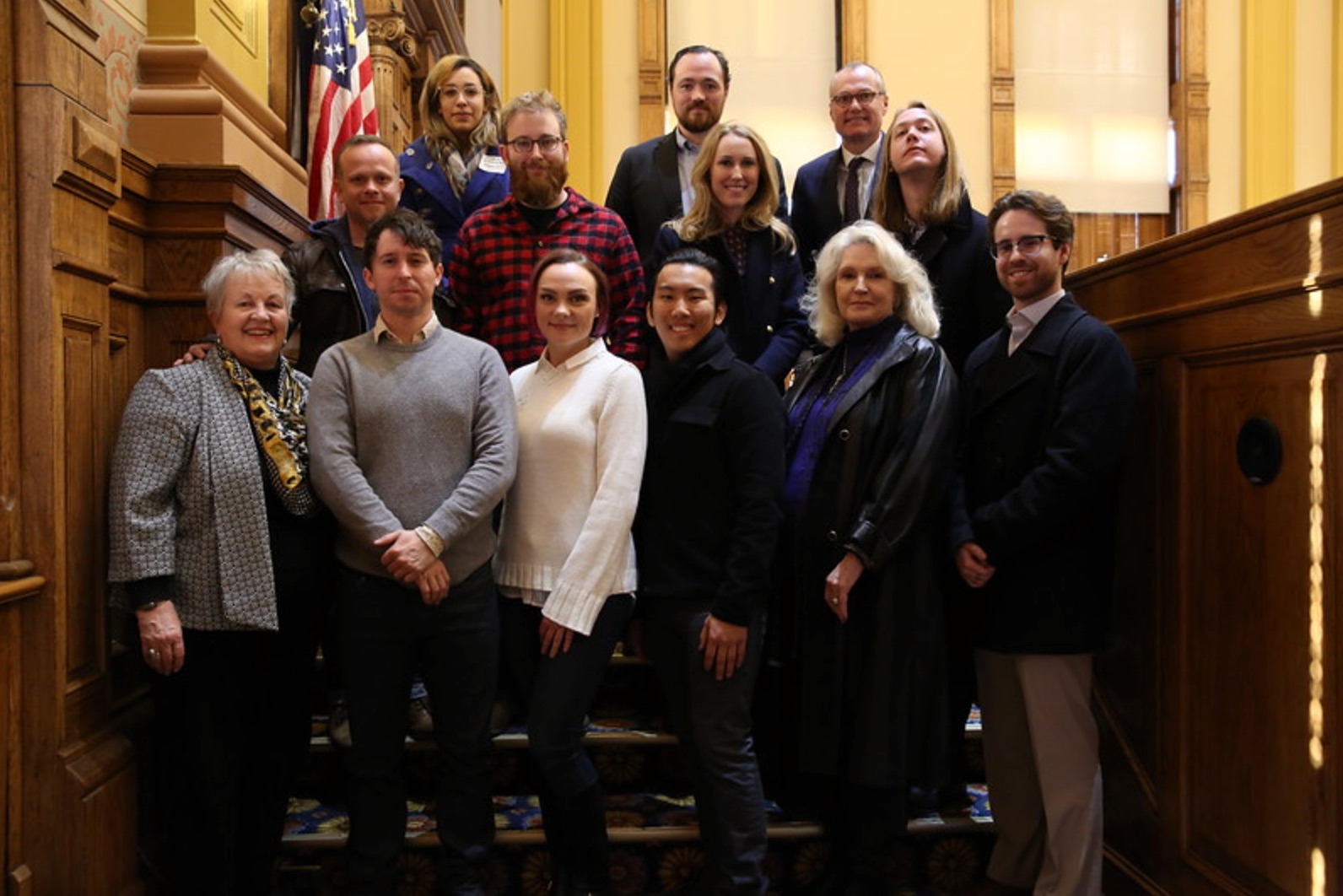
Above: my time as a legislative aide while a 3L at Georgia State University College of Law for Senate Minority Leader, Steve Henson, during the 2012 regular session. Many good memories on the Senate floor and great experience being part of the legislative process, including working with luminaries like former Senator Jason Carter, Senators Fort, Butler, James, Seay, and my current senator, Nan Orrock (pictured seated).
Legislation and the political process may appear nebulous to the casual observer, but it need not be. Indeed, the role of an attorney is to make more transparent the process and explain legislation into a language that all can understand. When people understand the rules that their elected are voting upon, they are much more likely to appreciate the work being done on their behalf and anticipate the impact that it will have upon their livelihoods.
Such is the case with the Georgia Entertainment Industry Postproduction Investment Act. Known as House Bill (H.B.) 199, this piece of legislation has the potential to greatly grow our economy by incentivizing investment in Georgia with a transferable tax credit. To read a full copy of the bill, please follow this link to view the bill at legis.ga.gov. If signed into law by Governor Deal, the first taxable year to which the credits apply begins on January 1, 2018.
What sets this legislation apart from its parent, the Georgia Entertainment Industry Investment Act, is qualified postproduction expenditures incurred in Georgia may also relate to footage shot outside of Georgia. So for films that shoot some scenes in Georgia, and others without, all of the footage, if processed in Georgia, qualifies as a postproduction expenditure.
Another aspect of this law that sets itself apart from the parent statute is how the extra ten percent tax credit applies. Initially, a twenty percent tax credit applies if the company meets the minimum spend of 500K. On productions, the ten percent markup applies if a Georgia promotion appears (i.e., peach logo). But in postproduction, the ten percent applies if the expenditures for the entertainment project (i.e., feature film or series) to which such services relate are also incurred in Georgia. This recognizes the distinct role postproduction plays.
What is nice about this statue is that it recognizes that there are smaller postproduction companies that do not have an aggregate payroll of a quarter million nor spend in excess of half a million in any one taxable year. That is why there is a provision for a twenty percent tax credit for “smaller postproduction companies” with an aggregate payroll between 100K to 500K and a minimum spend of 100K to 500K on qualified postproduction expenditures.
To qualify as a postproduction company under this law, a company must be a Georgia vendor, that is, maintain a business location (i.e., a physical presence) in state, which would require the usual formal registration, licensing, and revenue payments as applicable. The company would also need an aggregate payroll of 250K or more for employees working in the state, engage in qualified activities, and be approved by the Georgia Department of Revenue.
Qualified activities are activities on a qualified production pursuant to the parent statute employing traditional, emerging, and new workflow techniques used in postproduction for picture, sound, and music editing, recording and mixing, visual effects, graphic design, original scoring, animation, musical composition, and other activities performed after initial production and including activities performed on previously produced and edited content.
Qualified activities must further incur expenses in Georgia and involve one of the following aspects to become a qualified postproduction expenditure: photography and sound synch; sound recordings, musical compositions, lighting, and related services and materials; editing and related services; facilities and equipment rentals; vehicle leases; food and lodging; digital or tape editing; film processing; film transfers to tape or digital formats; sound mixing and computer graphics; special effects and animation services; airfare; insurance or bonding; aggregate payroll for Georgia labor; and, other “direct costs” to the entertainment project.
If the Department of Revenue interprets this statue in any way consistent to its parent, then I expect attorneys’ fees related to post production will not be viewed as a “direct cost” to the entertainment project. Fortunately, this is why hiring a music supervisor who may have a legal background and/or training will be an asset to your production. I created my consulting agency, Counterintuitive Consulting, with this directive in mind. To read more about my agency and how it can add value to your postproduction experience, click here.
To recap, not only must the postproduction company be 1) a Georgia vendor, 2) perform qualified activities, which activities consist of 3) qualified production expenses, but such expenses and activities must be attached to a qualified production. Under this law, not all productions qualify; the law expressly excludes projects related to news coverage, athletic events, local interest programming, instructional videos, and corporate videos. Qualified productions include film, video, or digital projects such as feature films, series, pilots, movies made for t.v., t.v. commercials, music videos, interactive entertainment (i.e., video games), or sound recording projects used in feature films, series, pilots, or t.v. movies.
The application process, and limitations on companies claiming the tax credit are similarly drafted as from the parent statute. There is also a provision for reporting labor statistics, which the postproduction companies will be expected to provide to the Department of Revenue on its Georgia income tax return. In turn, the agency will report its summary by June to the House Committee on Ways & Means and the Senate Finance Committee.
Other aspects of the law worth mentioning are the graduated caps to the aggregate amount of tax credits permitted each year (similar to what the legislature implemented for game developers, i.e. interactive entertainment), that phase out in 2023. If the caps are unmet in any one year, the unclaimed amounts roll over into the caps for the next year. Also, no one company can claim more than twenty percent (20%) of the aggregate amount available for any one year. I can think of at least one company that might be in danger of that 😉





